Home Tags Posts tagged with "facebook"
facebook
Mark Zuckerberg was in Beijing as a newly appointed member of the advisory board for Tsinghua University School of Economics and Management.
As part of that role, Mark Zuckerberg met students for a 30-minute chat, which he conducted in Mandarin.
Facebook founder’s attempt to woo the audience by speaking Mandarin has had mixed reviews from Chinese speakers.
There was plenty of reaction to his attempts to communicate in Chinese.
“It’s hard to describe in English what Zuckerberg’s Mandarin sounded like but I’d put it roughly at the level of someone who studied for two years in college, which means he can communicate like an articulate seven-year-old with a mouth full of marbles,” one blogger wrote.
Others commented: “Oh my god… this is terrible… but apart from the tones, he seems to have learnt the vocabulary and grammar pretty well.”
News outlet Quartz described Mark Zuckerberg’s 30-minute chat as making him sound “like someone was stepping on his face”.
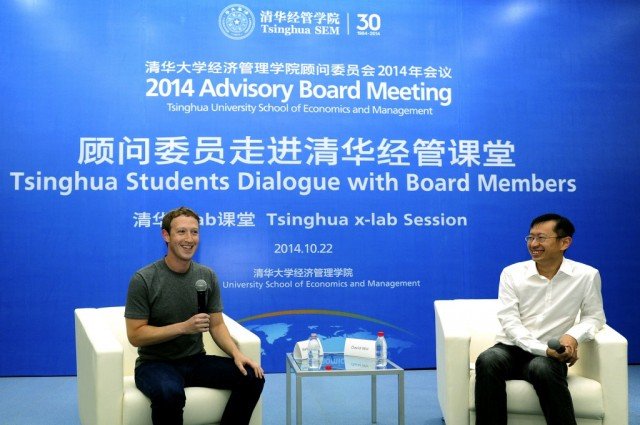
Mark Zuckerberg was in Beijing as a newly appointed member of the advisory board for Tsinghua University School of Economics and Management
One tonal slip-up led Mark Zuckerberg to claim that Facebook had just 11 mobile users instead of one billion.
While most agreed that his pronunciation was far from fluent, most were also impressed that he had attempted it at all.
Mark Zuckerberg, who is married to Chinese-American Priscilla Chan, set himself the goal of learning Mandarin in 2010, in part so that he could communicate with Priscilla’s relatives.
Facebook as a company is also keen to improve relationships with China. There is currently a ban on the use of the social media site, which dates since 2009.
There was no explicit chat about the ban and Mark Zuckerberg described China as a “great country”.
“The Chinese language is difficult, and I speak English, but I like challenges,” he said.
On Facebook’s future in China, Mark Zuckerberg was diplomatic: “We are already in China. We help Chinese companies gain customers abroad. We want to help the rest of the world connect to China.”
Fellow chief executive – Apple’s Tim Cook – was also in China, questioning officials about an alleged hack of its iCloud service.
Tim Cook will attend a meeting at Beijing’s Tsinghua University with Mark Zuckerberg later in the week.
Meanwhile he has had talks with the vice premier of China to discuss protecting user data in the wake of recent alleged hack attacks targeting iCloud users.
The attacks were revealed by Chinese activist group GreatFire.org, which accused the Chinese government of being involved.
iCloud user data was collected by creating a spoof icloud.com website.
Tim Cook also used the trip to China to visit Foxconn’s iPhone factory and said that the company would open 25 retail stores in China in the next two years.
[youtube S5qXkPNk5cA 650]
Facebook founder Mark Zuckerberg has reportedly bought two adjacent chunks of land in Hawaii for more than $100 million.
Mark Zuckerberg bought part of Kauai, the fourth largest of the Hawaiian islands, Forbes magazine reported.
The 700 acres on the north shore of the island includes Pila’a Beach – an isolated 393-acre swathe of land with a pristine white sand beach – and the adjacent 357-acre Kahu’aina Plantation, and an organic farm reports the Daily Mail.
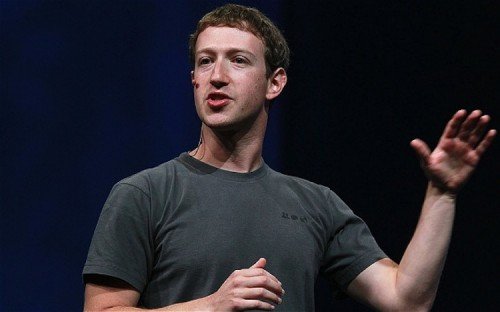
Mark Zuckerberg has reportedly bought two adjacent chunks of land in Hawaii for more than $100 million
The Pila’a Beach property consists of five separate parcels, each which could be developed into private homes.
However, according to Forbes, Mark Zuckerberg, 30, plans to build just one home.
Facebook chief executive plans to create a private getaway for his family but the beach will have to remain open to public as the state has no private stretches of sand.
Mark Zuckerberg, who is worth around $33 billion, is the second Silicon Valley billionaire to buy up part of Hawaii, reports the Telegraph.
Scammers are using Malaysia Airlines plane crash in east Ukraine to spread objectionable links, online security experts have warned.
Links to different websites disguised as a video of the Malaysia Airlines crash were posted on a Facebook page dedicated to one victim.
Many tweets have been posted that appeared to report the disaster, but actually included spam links.
One expert said the social networks should take more responsibility for removing them.

Scammers are using Malaysia Airlines plane crash in east Ukraine to spread objectionable links
A Facebook community page dedicated to Liam Sweeney, one of the 298 people victims, uses his name and picture.
Its sole post is a link entitled: “Video Camera Caught the moment plane MH17 Crash over Ukraine”.
Twitter’s rules state: “User abuse and technical abuse are not tolerated on Twitter.com, and may result in permanent suspension.
“Any accounts engaging in the activities specified below may be subject to permanent suspension: If you post multiple unrelated updates to a topic using #, trending or popular topic, or promoted trend.”
Many previous disasters had been exploited in a similar way and that it expected to see further exploitation of the MH17 crash.
Facebook is fighting a New York court order in which the social media website was forced to hand over data belonging to 381 people involved in a benefit fraud trial.
Facebook said the request was “by far the largest” it had ever received from a government body.
Photographs, private messages and other information were supplied to a New York court last year, but the process was only made public by a judge this week.
The ruling defined Facebook as a “digital landlord”.
A judge said this definition meant the company must comply with search warrants.
The original case investigated fraudulent claimants of US federal disability benefits, whose Facebook accounts apparently showed that they were in fact healthy.
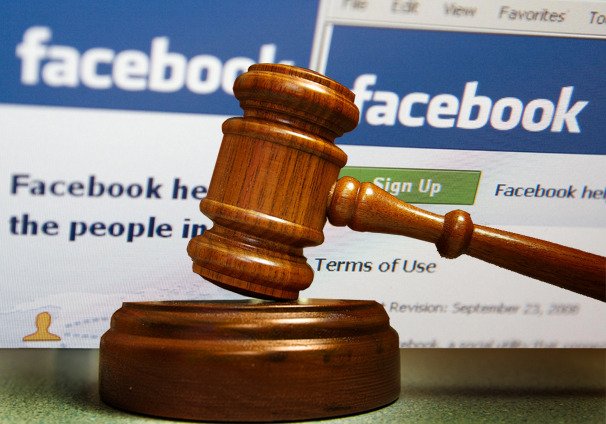
Facebook is fighting a New York court order in which it was forced to hand over data belonging to 381 people involved in a benefit fraud trial
The social media site was ordered to hand over information from the 381 accounts, which the court said contained “evidence of criminality”.
After an appeal was denied, Facebook complied with the request but protested that it violated the Fourth Amendment of the US constitution, which protects against “unreasonable searches and seizures”.
Facebook also voiced concerns about the lack of date restrictions on the warrant, which it argued allowed the US government to keep the data indefinitely, and the range of data requested, which it said would contain private material which bore no relation to the trial.
The proceedings have been kept private by the court, but after a fresh appeal by Facebook a New York judge has now made the court filing public.
Facebook said the government had obtained “gag orders”, preventing it from telling the account holders that it had been forced to hand over their data.
“This unprecedented request is by far the largest we’ve ever received – by a magnitude of more than ten – and we have argued that it was unconstitutional from the start,” wrote Chris Sonderby, a legal adviser to Facebook.
“Of the 381 people whose accounts were the subject of these warrants, 62 were later charged in a disability fraud case.
“This means that no charges will be brought against more than 300 people whose data was sought by the government without prior notice to the people affected.”
But a spokesperson for the Manhattan district attorney defended the court’s actions.
“This was a massive scheme involving as many as 1,000 people who defrauded the federal government,” said Joan Vollero.
“The defendants in this case repeatedly lied to the government about their mental, physical, and social capabilities. Their Facebook accounts told a different story.”
In a summation of the legal justification for the court’s decision, the judge wrote: “Facebook could best be described as a digital landlord, a virtual custodian or storage facility for millions of tenant users and their information.
“Hence, the search warrants authorize the search and seizure of digital information contained within the Facebook server.”
[youtube JtyUmfP6O8E 650]
Stockton Police Department’s Facebook page has been flooded with comments about the mugshot of an alleged criminal, named Jeremy Meeks.
Jeremy Meeks is a 30-year-old who was arrested on felony weapons charges in Stockton, California, according to the local police force.
He’s also arguably the most popular suspect on the department’s Facebook page.
Jeremy Meeks’ police mugshot has generated 38,000 likes and 12,000 comments.
Stockton Police say they caught Jeremy Meeks as part of its Operation Ceasefire operation.

Jeremy Meeks’ police mugshot has generated 38,000 likes and 12,000 comments on Stockton Police Department’s Facebook page (photo Stockton Police Department)
It included the area’s gang violence suppression unit, community response team, gang task force and nine other organizations, including the FBI.
Jeremy Meeks was arrested on Wednesday on five weapons charges and one gang charge, according to Officer Joseph Silva, a spokesman for the Stockton Police Department.
He was one of four men arrested in the Weston Ranch area of Stockton, a city of about 300,000 people in northern California.
Four guns were confiscated.
Joseph Silva called Jeremy Meeks “one of the most violent criminals in the Stockton area”.
Jeremy Meeks has done an interview with AKXTV from jail, saying authorities arrested him after finding a gun in his boot.
“I just visited my wife and she said I like, blew up all over Facebook,” he said.
“I just want [people] to know that this is really not like me, I’m not some kingpin.”
One user has also set up a Facebook fan page for Jeremy Meeks, who is being held in the San Joaquin County Jail on $900,000 bail.
The other three men arrested, whose mugshots also appear on the Stockton Police Department’s Facebook page, had a total of 350 comments between them.
[youtube PhG4-S9W0gc 650]
Facebook was inaccessible for at least 1.3 billion users for around 15 minutes this morning.
People trying to log on to the site were faced with a message saying: “Something went wrong. We’re working to get it fixed as soon as we can.”
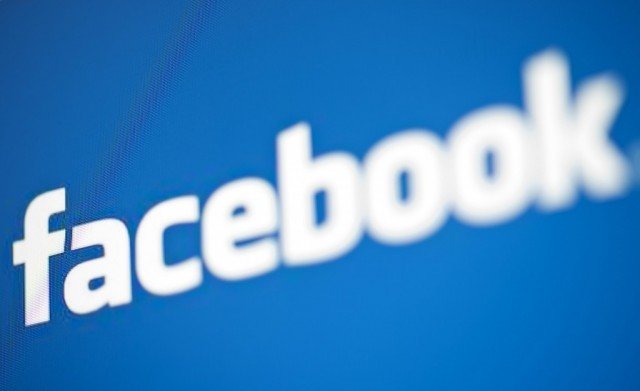
Facebook was inaccessible for at least 1.3 billion users for around 15 minutes
The short shutdown drew attention across the web with many taking to Twitter to ask what all the fuss was about.
Facebook apologized for the problem but did not say what caused it.
“Earlier this morning, we experienced an issue that prevented people from posting to Facebook for a brief period of time. We resolved the issue quickly, and we are now back to 100%. We’re sorry for any inconvenience this may have caused.”
It is not yet clear how many countries were affected.
Facebook has announced new default settings and a privacy checkup tool.
On Thursday, before the company’s annual shareholders’ meeting, Facebook announced that posts from new users will only be shared with “Friends” unless they change the default settings and choose “Public”.

Facebook announced that posts from new users will only be shared with Friends unless they change the default settings and choose Public
Before, it was the other way around, something that caused privacy concerns because new users might not understand that “Public” meant that people outside of their social circle could see their photos and status updates.
“While some people want to post to everyone, others have told us that they are more comfortable sharing with a smaller group, like just their friends,” Facebook wrote in a statement.
“We recognize that it is much worse for someone to accidentally share with everyone when they actually meant to share just with friends, compared with the reverse.”
That should make it easier for Facebook newbies to avoid sharing vacation photos with people they don’t know. But even longtime Facebook users can get confused over what exactly they are sharing.
For them, Facebook is releasing a new “privacy checkup tool” that will take users through who is seeing their posts, what apps they are using, and what private information they might be sharing on their profile.
The viral post claiming that “16 people are confirmed dead in a roller coaster accident that occurred at Universal Studios in Florida,” it’s fake and is just a scam that could potentially install a rogue app in your Facebook account.
The post says: “Fox Breaking News – [Shocking Video Footage] – 16 people are confirmed dead in a roller coaster accident that occurred at Universal Studios in Florida. The roller coaster appeared to have suffered a mechanical breakdown causing it to veer off the tracks in mid air plummetting all 24 passangers into the ground.”

Scam postings promote CCTV video footage of a roller coaster accident at Universal Studios in Florida
There’s no video, and the message directs users to a website that looks like Facebook but asks users to share it before going further. Some versions of it will ask users to download a rogue Facebook app that will replicate instances of it on your Facebook newsfeed.
The post could also send users to a page that has surveys that deliver no video but try to get personal information. Or even worse, it could spread malicious software.
It is recommended that you remove the app from your Facebook account. It’s also recommended to delete any instances of the post from your Facebook wall and “unlike” it.
Make sure you’re logged into your Facebook account and go to your Facebook application settings. It will list all the applications that you have given access to.
Go below and click the “X” on the right side of the app in order to remove it. Some of the fake scam apps use names like “CNN,” “Fox News,” or “YouTube” to trick users.
You can find detailed instructions on how to delete the Orlando roller coaster accident here.
Facebook has acquired ProtoGeo, a Finnish company that makes fitness tracking app Moves.
Helsinki-based ProtoGeo created the Moves app that uses a smartphone’s built-in sensors to track activity and calories burned.
The acquisition offers Facebook an entry into the burgeoning health technology market.
Other recent purchases include mobile messaging firm WhatsApp and virtual headset maker Oculus.
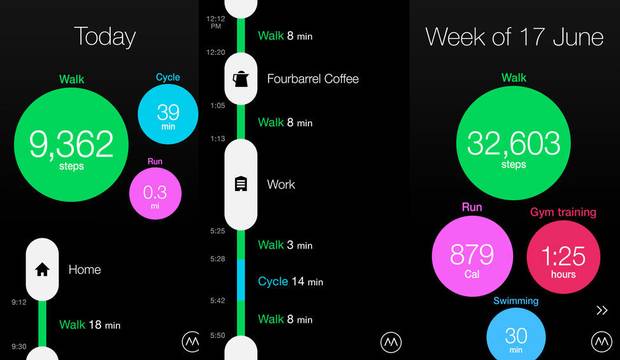
ProtoGeo created the Moves app that uses a smartphone’s built-in sensors to track activity and calories burned
Facebook did not reveal how much it paid for ProtoGeo, which has fewer than 10 employees, but it is believed to be a fraction of the price it has paid for more high-profile firms recently.
The social network paid $2 billion for Oculus VR and spent $19 billion on WhatsApp.
In a blog post, ProtoGeo moved to reassure its users about the purchase.
“For those of you that use the Moves app – the Moves experience will continue to operate as a stand-alone app, and there are no plans to change that or co-mingle data with Facebook.”
Meanwhile Facebook said of the purchase: “The Moves team has built an incredible tool for the millions of people who want to better understand their daily fitness activity, and we’re looking forward to the app continuing to gain momentum.”
The app runs in the background of users’ phones, using location data to monitor activities through the day.
The free app has been downloaded more than four million times for both iPhone and Android phones, according to the firm.
Many of the big technology firms are seeing money to be made from health technology. There is a range of fitness bands and smartwatches on the market already.
Apple is rumored to be on the verge of launching its own smartwatch with fitness features and Google last month launched software for wearables.
But for Facebook, the purchase of a fitness app is likely to be all about new data which will allow it to better target adverts, thinks Alys Woodward, an analyst with research firm IDC.
“They want to know more stuff about what people do and where they are. This is useful information even if they don’t tie it back to the individual,” she said.
[youtube mhj1wS3Aui8 650]
A new research suggests that spending lots of time on Facebook looking at pictures of friends could make women insecure about their body image.
The more women are exposed to “selfies” and other photos on social media, the more they compare themselves negatively, according to US and UK experts.
Friends’ photos may be more influential than celebrity shots as they are of known contacts, the study says.
The study is the first to link time on social media to poor body image.
The mass media are known to influence how people feel about their appearance.

Young women are particularly high users of social networking sites and post more photographs of themselves on the internet than do men
But little is known about how social media impact on self-image.
Young women are particularly high users of social networking sites and post more photographs of themselves on the internet than do men.
To look at the impact on body image, researchers at the University of Strathclyde, Ohio University and University of Iowa surveyed 881 female college students in the US.
The women answered questions about their Facebook use, eating and exercise regimes, and body image.
The research, presented at a conference in Seattle, found no link with eating disorders.
But it did find a link between time spent on social networks and negative comparisons about body image.
The more time women spent on Facebook, the more they compared their bodies with those of their friends, and the more they felt negative about their appearance.
Mark Zuckerberg has revealed he has called President Barack Obama to “express frustration” over US digital surveillance.
The 29-year-old Facebook founder said in a blog post the US government “should be the champion for the internet, not a threat”.
Mark Zuckerberg’s comments come a day after a report the NSA imitated a Facebook server to infect surveillance targets’ computers.
The NSA said the report was “inaccurate”.
Mark Zuckerberg said in September that the US “blew it” on internet spying.
He wrote on Thursday “it seems like it will take a very long time for true full reform”.
“When our engineers work tirelessly to improve security, we imagine we’re protecting you against criminals, not our own government,” Mark Zuckerberg said in his blog post.
“The US government should be the champion for the internet, not a threat.

Mark Zuckerberg has revealed he has called President Barack Obama to “express frustration” over US digital surveillance
“They need to be much more transparent about what they’re doing, or otherwise people will believe the worst.”
The NSA’s activities were leaked by a former contractor for the agency, Edward Snowden, last year.
Edward Snowden’s leaks have pointed to the NSA collecting phone records, tapping fiber-optic cables that carry global communications and hacking networks.
According to the documents, the agencies had “backdoor” access to the servers of nine major technology companies including Microsoft, Yahoo, Google, Facebook, PalTalk, AOL, Skype, YouTube and Apple.
All the companies named have denied their involvement.
The NSA called the latest claims, that it expanded surveillance by using malware, “inaccurate”.
The agency said in a statement: “The NSA uses its technical capabilities only to support lawful and appropriate foreign intelligence operations, all of which must be carried out in strict accordance with its authorities.”
White House spokeswoman Caitlin Hayden confirmed that the president spoke with Mark Zuckerberg on Wednesday evening regarding “recent reports in the press about alleged activities by the US intelligence community”. She gave no further comment.
In his latest blog post, Mark Zuckerberg said that to keep the internet strong, “we need to keep it secure”.
[youtube M6qXlSdMY-s 650]
Facebook’s acquisition of mobile messaging service WhatsApp has been opposed by privacy groups.
Facebook is planning to buy WhatsApp for around $19 billion.
Opponents want the US Federal Trade Commission to stop the deal until Facebook provides more information on what it plans to do with the personal data of WhatsApp’s users.
But Facebook said it will operate as a separate company and honor existing privacy arrangements, which include not collecting user data for advertising.
“WhatsApp built a user-base based on its commitment not to collect user data for advertising revenue,” read a complaint filed with the FTC. It was drawn up by two non-profit groups, the Electronic Privacy Information Center and the Center for Digital Democracy.
They added: “Users provided detailed personal information to the company including private text to close friends. Facebook routinely makes use of user information for advertising purposes and has made clear that it intends to incorporate the data of WhatsApp users into the user profiling business model.
“The proposed acquisition will therefore violate WhatsApp users’ understanding of their exposure to online advertising and constitutes an unfair and deceptive trade practice, subject to investigation by the Federal Trade Commission.”

Facebook’s acquisition of mobile messaging service WhatsApp has been opposed by privacy groups
And the groups, which work on research and consumer protection online, asked the regulators to investigate the deal “specifically with regard to the ability of Facebook to access WhatsApp’s store of user mobile phone numbers and metadata”.
Facebook, the world’s top social network with 1.2 billion users, generates the majority of its revenue by showing ads that target users by age, gender and other traits.
“As we have said repeatedly, WhatsApp will operate as a separate company and will honor its commitments to privacy and security,” Facebook said in a statement seen by Reuters.
Facebook announced its intention to buy WhatsApp, which has 450 million users who are able to send instant messages and other media over mobile, with cash and stock.
There is no charge for individual messages, which are sent using Wi-Fi or data connections, making it cheaper than SMS messaging in many cases. Other users pay around $1 per year subscription.
Despite assurances by WhatsApp and Facebook that the privacy policies will not change, the groups noted that Mark Zuckerberg’s social networking company has in the past amended an acquired-company’s privacy policies.
Notably, it did so with the Instagram photo-sharing service that it bought in 2012.
Regulators must require that Facebook “insulate” WhatsApp user information from access by Facebook’s data collection practices, read the complaint, which was dated March 6, 2014.
“WhatsApp users could not reasonably have anticipated that by selecting a pro-privacy messaging service, they would subject their data to Facebook’s data collection practices,” read the filing.
The FTC will decide whether the acquisition can go ahead and, if so, whether or not conditions should be imposed.
Turkish Prime Minister Recep Tayyip Erdogan has announced that his government could ban Facebook and YouTube, arguing that opponents are using social media to attack him.
However, President Abdullah Gul later called such a ban “out of the question”.
Allegations of corruption against Recep Tayyip Erdogan have been repeated on the social media sites.

Recep Tayyip Erdogan has announced that his government could ban Facebook and YouTube, arguing that opponents are using social media to attack him
The leaks included a phone conversation in which, allegedly, he and his son discussed how to hide huge sums of money. Recep Tayyip Erdogan called it a montage.
The prime minister’s Islamist-rooted AK Party faces key local elections on March 30.
“We will not leave this nation at the mercy of YouTube and Facebook,” Recep Tayyip Erdogan told the Turkish broadcaster ATV.
“We will take the necessary steps in the strongest way.”
Asked if that could include barring the social media sites, he said: “Included.”
Recep Tayyip Erdogan said the two sites were being used for “all kinds of immorality, all kinds of espionage”.
A major corruption investigation has targeted government allies of the prime minister – and he has responded by moving hundreds of police officers and prosecutors to other duties.
[youtube 0TzFQkX9JvM 650]
Facebook has quietly ended its three-year-old email address system “@facebook.com”.
From now on, emails sent to a “@facebook.com” address will be forwarded to the personal email address from which the member signed up for the site.
“We’re making this change because most people haven’t been using their Facebook email address,” said a Facebook spokesperson.
The change will happen in early March.
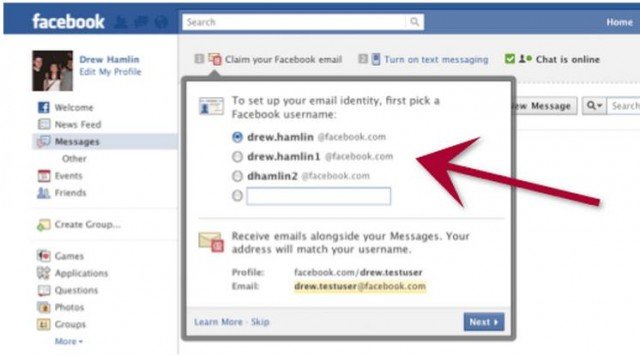
Facebook has quietly ended its three-year-old email address system
The service was launched in November 2010 and billed as a way to streamline users’ communication by providing a single inbox that could receive Facebook messages, SMS texts, and conventional emails.
The service came under fire in 2012 when Facebook replaced users’ published email addresses with their “@facebook.com” email on their profile.
The company later reversed course.
The move comes just a few days after Facebook’s surprise purchase of messaging app WhatsApp for $19 billion.
Mark Zuckerberg and Priscilla Chan have been named joint top US philanthropists for 2013.
Facebook founder and his wife gained the accolade after a donation of 18 million Facebook shares to a Silicon Valley foundation.
The donation, worth more than $970 million, was the largest in the US in 2013.
The gift outstripped philanthropists such as Bill and Melinda Gates, the Chronicle of Philanthropy said.
Mark Zuckerberg and his wife made the $970 million donation to the Silicon Valley Community Foundation, a charity that manages and distributes charitable funds.

Mark Zuckerberg and Priscilla Chan have been named joint top US philanthropists for 2013
The shares have helped to make the foundation one of the largest in the US, the Chronicle of Philanthropy said.
Over the past two years, Mark Zuckerberg and Priscilla Chan have donated about 36 million Facebook shares to the foundation.
Funds have broadly been distributed to education and health, with $5 million being distributed to a health clinic in East Palo Alto, for example.
Philanthropists who have previously headed the list, such as Microsoft co-founder Bill Gates and his wife, Melinda, have been making good on previous years’ pledges.
Bill and Melinda Gates gave their foundation slightly more than $181.3 million last year, and continue to honor a pledge of about $3.3 billion they made in 2004.
[youtube QSarDLi5Wxw 650]
According to the latest Edward Snowden leaks, the UK intelligence agency , GCHQ, has monitored in real-time YouTube video views, Facebook “likes” and Blogger visits.
Details of an alleged GCHQ program codenamed Squeaky Dolphin have been published by NBC News.
It reports that the agency showed off its abilities to the National Security Agency (NSA) in 2012.
Facebook has since started encrypting its data, but Google’s YouTube and Blogger services remain unencrypted.
Both firms have said that they did not give GCHQ (Government Communications Headquarters) permission to access the data.
The alleged operation’s leaked logo – showing a dolphin holding a canister branded GTE – appears to refer to Global Telecoms Exploitation, a GCHQ division believed to be capable of collecting data from fibre-optic cables.
According to an earlier leak, published by the Guardian, GCHQ has been tapping fibre-optic cables to create a “buffer” of information it could search through since at least 2011, as part of a scheme called Tempora.

GCHQ has monitored in real-time YouTube video views, Facebook “likes” and Blogger visits
The newspaper said that by 2012 the agency had tapped more than 200 cables – including transatlantic communication links – and was able to process phone and internet data taken from up to 46 of them at a time.
GCHQ declined to comment on the specifics of the latest report.
The NBC report is based on a presentation entitled Psychology: A New Kind of Sigdev [signals development]. It was part of the trove of documents former NSA contractor Edward Snowden passed to journalist Glenn Greenwald, who contributed to NBC’s report.
The papers refer to the use of Splunk Dashboard to provide real-time analysis of how people use YouTube, Facebook and Blogger.
Splunk is commercially available software designed to let organisations “listen” to their own data.
Examples that GCHQ is said to have shown off include:
- a table showing how many people based in the city of Lagos looked at a specific job vacancies blog over a 24-hour period
- a graph showing how many London-based internet users “liked” links about former Defense Secretary Liam Fox on Facebook over a week-long period
- a pie chart highlighting 20 trending YouTube video tags a day before planned anti-government protests in Bahrain
Although the examples provided do not identify specific users, NBC suggests this would have been possible to do if GCHQ had access to such data.
A spokesman for Facebook added: “Network security is an important part of the way we protect user information, which is why we finished moving our site traffic to HTTPS [encryption] by default last year, implemented Perfect Forward Secrecy, and continue to strengthen all aspects of our network.”
[youtube gpmA9ujR-cg 650]
Facebook has developed a “Sympathize” button as an alternative to the “Like” button for use in certain situations.
If a user selected a negative emotion from Facebook’s list of feelings in a status update then the “Like” button would change to “Sympathize”.
A Facebook engineer said at a company event that the button had been created as part of an internal project.
But he later went on to say there were no plans to launch it at the moment.
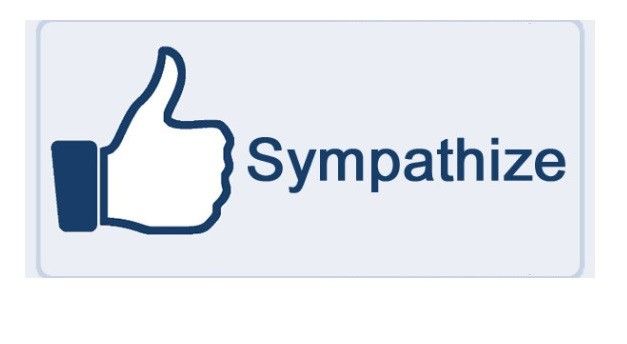
Facebook has developed a “Sympathize” button as an alternative to the “Like” button for use in certain situations
Facebook were holding a “compassion research day” where members of the public and researchers are invited along to “improve [Facebook’s] understanding of the driving forces and benefits of compassion”.
In a Q&A session an audience member asked if Facebook had thought about changing the “Like” button when it felt inappropriate in relation to what a user had posted, for example when someone had written that their parents had died.
Dan Muriello, a software engineer at Facebook, said another engineer had worked on a hackathon project “a while back” to change the “Like” button to “Sympathize”.
It would not work for every post he said but if you tag a status with certain emotions from a fixed list then the “Like” button would change.
“A lot of people were very excited. But we made a decision that it was not exactly the right time to launch that product. Yet,” he said.
Facebook hackathons are events where the company’s engineers get together and brainstorm new ideas, like Facebook Chat and the “friend suggester” facility.
Facebook unveils the “Unfollow” button which work in the same way that users were able to “Hide All” from friends in the past, simply with new phrasing, TechCrunch reported.
The idea is that users can block content they don’t want to see from their friends without going so far as defriending them.
In the past, the “Hide All” option pretty much did the same thing, keeping all updates from a user hidden, a discreet way to make someone disappear from your virtual life without the awkwardness of unfriending them.
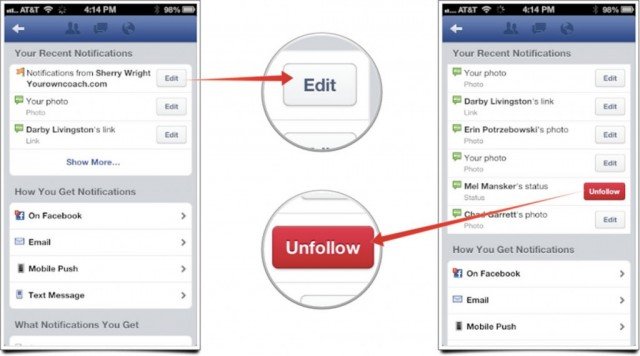
Facebook unveils the “Unfollow” button
On Facebook, you can already unfollow news organizations and people you are following but are not friends with. The ability to unfollow all users will simply standardize the language across the site, not to mention add an element of schadenfreude when banishing exes from your News Feed.
Find an update from someone you don’t want to follow anymore, click on the drop-down menu on the top-right corner of the post, and select “Unfollow”.
The unfollow option is the much the less confrontational way of making someone disappear, since they won’t be notified of your secret vote of disinterest and will still see you in their friends list.
Twitter plans to join the stock market in the most hotly anticipated flotation since Facebook’s last year.
Referring to the official paperwork needed to join the market, the company tweeted: “We’ve confidentially submitted an S-1 to the SEC for a planned IPO [initial public offering].”
Investors value Twitter, founded in 2006 by Jack Dorsey, Biz Stone and Evan Williams, at more than $10 billion.
Twitter gave no further details as to the timing or price of the offering.
The microblogging service is on track to post $583 million in revenue in 2013, according to advertising consultancy eMarketer, up from $288 million in 2012.
Most of Twitter’s funding comes from advertising, with companies paying for “promoted tweets” that appear in users’ Twitter feeds.
Advertisers are keen to target Twitter’s 200 million active users, who send more than 500 million tweets a day.
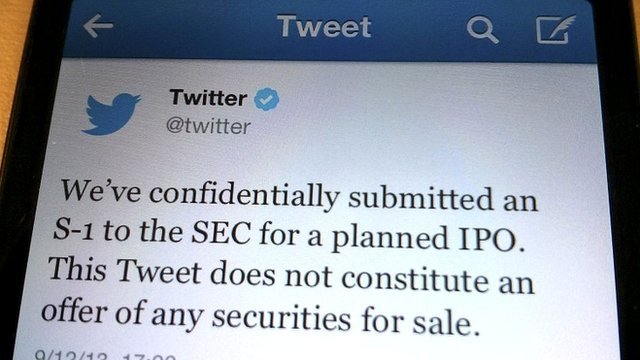
Twitter plans to join the stock market in the most hotly anticipated flotation since Facebook’s last year
But some analysts believe the risk for Twitter post-flotation is that if the drive for greater advertising revenue leads to increased numbers of adverts in and around the site, they could become intrusive and unpopular with users.
Nearly two-thirds of users access Twitter via mobile devices that have traditionally been difficult for advertisers to reach.
This is one reason why Twitter has acquired MoPub, a mobile-focused advertising exchange, for a reported $350 million.
Facebook listed on the stock market in May last year. Although it initially created excitement among investors, its share price performed poorly, before recovering this summer.
The timing of the IPO is likely to be related to renewed activity in stock market flotations. There have been 131 IPOs priced so far in 2013, according to IPO tracking firm Renaissance Capital – a 44% increase on the same period last year.
Analysts say Twitter must continue to innovate under the scrutiny of public ownership.
Once a company has filed paperwork with US regulators for a planned IPO, it enters a so-called “quiet period” when it is not allowed to speak to the media.
According to the Securities and Exchange Commission’s website, a company can file a confidential prospectus for a public share sale if it is classified as an “emerging growth company” with revenue of less than $1 billion.
[youtube yyj_Xn_RZZo]
According to a picture tweeted by Huffington Post editor Bianca Bosker, Facebook sells a shade of nail polish at its Menlo Park, California, headquarters called Social Butterfly Blue, for $4.95 a bottle.
While Facebook’s logo isn’t featured on the packaging, the distinctive blue is recognizable to anyone familiar with the social network’s home page.

Facebook sells a shade of nail polish at its Menlo Park, California, headquarters called Social Butterfly Blue, for $4.95 a bottle
According to an article published in the New Yorker in April, Mark Zuckerberg chose that particular color for his website because he is red-green colorblind.
Mark Zuckerberg, 29, explained: “Blue is the richest color for me – I can see all of blue.”
Another possible reason behind the iconic hue is that blue has been proven to trigger certain emotions when it comes to marketing.
The nail polish bottles, which can only be purchased at the Facebook campus, are adorned with tiny butterflies.
According to a newly released Facebook report, governments around the world requested information on about 38,000 of the social network users in the first six months of 2013.
Facebook’s Global Government Requests Report, released on Tuesday for the first time, offers details on official requests from 74 countries.
The US made by far the most requests, asking for information on between 20,000 and 21,000 users.
UK authorities requested Facebook hand over data on 2,337 users.
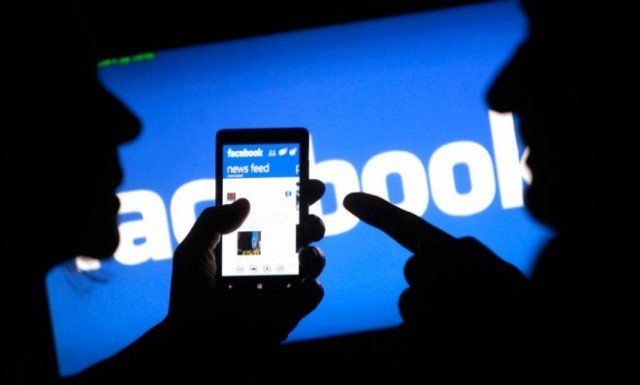
Governments around the world requested information on about 38,000 Facebook users in the first six months of 2013
“We will continue to be aggressive advocates for greater disclosure,” Facebook said.
“We hope this report will be useful to our users in the ongoing debate about the proper standards for government requests for user information in official investigations,” wrote Facebook lawyer Colin Stretch.
“And while we view this compilation as an important first report – it will not be our last.”
Unlike other countries, which had an exact figure, the US data was given as a range due to it being forbidden for companies to disclose how many requests they have had.
“In coming reports, we hope to be able to provide even more information about the requests we receive from law enforcement authorities,” Colin Stretch added.
The report covers the first six months of 2013, ending June 30, and is the first time Facebook has released data relating to these kind of requests.
The company said it hoped to publish similar reports every six months from now on, and hoped the report highlighted the “stringent processes” involved in the obtaining of user information.
Facebook did not give a break-down of why the requests were made, instead just dividing the data by country, outlining how many requests were made, and how many users were involved. Several users could be cited in one request.
Facebook will have to pay $15 for each of the nearly 614,000 users whose personal details appeared in ads on the site without their permission.
The names and pictures of an estimated 150 million Facebook members were used in Sponsored Stories, but only those who responded to an email from the site earlier this year will be compensated.
Privacy organizations will also receive some of the $20 million settlement.
The payout was approved by a US court on Monday following a class action filed against Facebook in 2011 by five of its users.
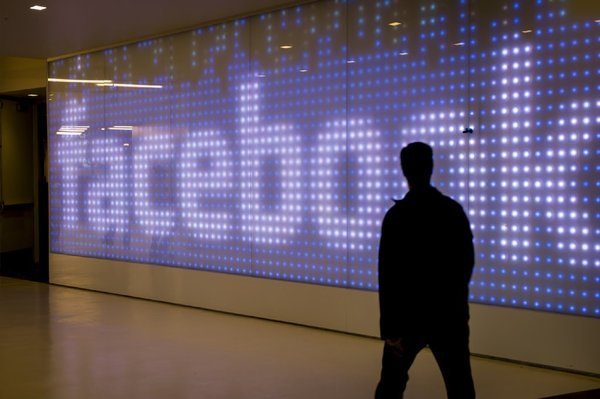
Approximately 614,000 Facebook users whose personal details appeared in ads on the site without their permission will each receive a $15 payout
The group said their details had been used to promote products and services through the site’s Sponsored Stories programme, without paying them or giving them the choice to opt-out.
A Sponsored Story is a tailored advertisement that appears on members’ Facebook pages, highlighting products a user’s friends have endorsed or “liked” on the site.
US District Judge Richard Seeborg acknowledged that the $15 payments were relatively small, but said it had not been established that Facebook had “undisputedly violated the law”.
He added that the claimants could not prove they were “harmed in any meaningful way”.
The court estimated that Facebook had made about $73 million in profit from the Sponsored Stories featuring details of the 150 million members.
The settlement also requires Facebook to make changes to its “Statement of Rights” and to give users more information and control over how their details are used in the future.
This move was estimated by the plaintiff’s lawyers to cost Facebook $145 million in advertising revenue.
Approximately 7,000 Facebook users opted out of the settlement altogether, allowing them to bring their own legal action against the social network.
Facebook shares jumped by more than 25% at the market opening on Thursday, after it beat profit forecasts with stronger than expected mobile ad sales.
On Wednesday, the social networking giant had reported profits of $333 million in Q2 2013.
When trading began in New York, Facebook shares were 25.6% higher at $33.30, the highest since May 2012.
Facebook, which is the world’s largest social networking company, floated on the Nasdaq at $38 a share last year.
Following the release of the latest results, at least 16 brokerages raised their price targets for the firm.
“Facebook has discovered the formula to begin significantly extracting value from its 1.16 billion global users,” said JMP Securities analyst Ronald Josey.
A year ago, Facebook had no mobile advertising and many analysts were skeptical about the firm’s ability to make money in the arena.
Internet companies have been struggling with how to display adverts on smaller screens, as more people use their smartphones to access the web.
Facebook’s revenue from smartphones and tablets made up almost half of total advertising revenue in the second quarter.

Facebook shares jumped by more than 25 percent after it beat profit forecasts with stronger than expected mobile ad sales
The company is widely expected to launch mobile video advertising in the fourth quarter.
“Facebook’s massive audience should be irresistible to brand advertisers as the company preps to launch 15-second video ads, which could be Facebook’s next billion-dollar business,” said analysts at Jefferies & Co.
Meanwhile, analysts at Morgan Stanley expect video advertisements to boost Facebook’s revenues by more than 10%.
In a statement, Facebook chief executive Mark Zuckerberg said: “The work we’ve done to make mobile the best Facebook experience is showing good results and provides us with a solid foundation for the future.”
According to chief financial officer David Ebersman, 20 billion minutes a day were spent on Facebook in June.
“This quarter marks the end of our first year as a public company and I think we’ve created a good foundation for the future,” said Mark Zuckerberg on a call to discuss the earnings.
Facebook made $655.6 million from mobile ads between April and June – more than 41% of the $1.6 billion in overall advertising revenue, compared with 30% for the same period last year. The number of mobile users expanded 51% to 819 million.
“I’d say that Facebook is in a unique position with the ad market right now in that it is very far ahead of any other major ad platform in mobile display advertising,” said Clark Fredricksen of research firm eMarketer.
Facebook has focused on perfecting its ad sales programmes. Last month, it announced changes to its Ads Manager which it said would provide advertisers with better data.
In April, Facebook won back General Motors almost a year after the car company pulled advertising from the site.
Analysts said Facebook’s rival Google has fared less well in the mobile advertising market so far.
Last week, Google posted second-quarter results which fell short of Wall Street’s expectations.
“The Facebook versus Google debate will return to the investment community, after a year-long hiatus,” Stifel Nicolaus analyst Jordan Rohan said.
[youtube 4hjA0VPPdDw]
Facebook has decided to make a major change in its advertising systems in an attempt to deal with concerns about offensive content.
There will now be new restrictions on where adverts appear on the site.
Marks and Spencer and BSkyB were among companies to suspend advertising after complaints that adverts had been placed on pages with offensive material.
Facebook is now planning to remove any advertising from many of its pages.
The social network’s move follows complaints about a Sky advert promoting an M&S voucher.
The advert was placed on a Facebook page called “cute and gay boys”. The page featured photographs of teenage boys.
In a blogpost on Friday, Facebook said: “We recognize we need to do more to prevent situations where ads are displayed alongside controversial Pages and Groups. So we are taking action.”
Facebook said that from Monday it will implement a new process to determine which pages or groups should feature adverts alongside the content.
There will be no adverts on pages that feature any violent or controversial content, even if such content is not in violation of the company’s rules.
According to one source, Facebook will create a “gold standard” of around 10,000 pages that are deemed suitable for adverts, and then inspect other pages to see if they can be added to the list. All adverts will be removed from other pages.
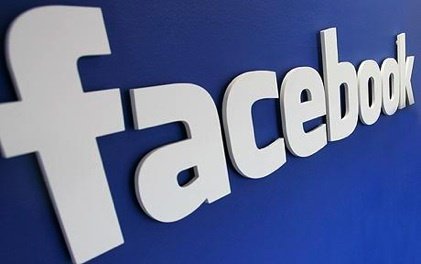
Facebook removes ads from controversial pages to avoid boycott
A spokesman said this would be a labor-intensive process but we take this” very seriously.”
BskyB said it looked forward to discussing the new measures and would keep the situation under review.
M&S had asked BSkyB to remove the advert, and it suspended some of its own advertising campaigns on Facebook.
BSkyB suspended all of its advertising on the social network, where it has been a major customer.
Both companies had said they were keen to use Facebook again, but needed to be sure that their advertising would not appear next to offensive content, or material that might reflect poorly on their brands.
Speaking before Facebook announced its policy change, a spokesman for BSkyB said: “We have asked Facebook to devise safeguards to ensure our content does not appear alongside inappropriate material in the future.
“We will review the situation in due course.”
Sources at M&S said Facebook had been taking the issue very seriously at the highest level.
In an additional statement, an M&S spokeswoman said the company did not “tolerate any inappropriate use or positioning of its brand and has very clear policies that govern where and how our brand is used”.
She added: “We take any suggestion that these policies are not being adhered to very seriously and always investigate them thoroughly.”
Earlier this month, Facebook was forced to act against misogynist content on its site after protests from women’s groups led some advertisers to suspend campaigns.
[youtube MG7sgIufiMA]
Paris Jackson was reportedly the victim of cruel cyber-bullying, it has been claimed today.
Paris Jackson, 15, is reported to have suffered so many vile taunts on-line that she was eventually pushed to breaking point.
TMZ reports that Paris Jackson – who attempted to take her own life earlier this month – was almost “destroyed” by the vicious insults.
“Some of the comments involve the various molestation allegations … others involve the odd life Paris lived while Michael was alive,” the site claims.
The source adds: “They destroyed her.”

Paris Jackson has suffered so many vile taunts on-line that she was eventually pushed to breaking point
It is understood that Paris Jackson, who is recovering at UCLA Medica Center, does not currently have access to the social networking site Facebook.
However, her family are reportedly worried for Michael Jackson’s daughter when she eventually returns to the site.
The reports suggests that family members have even tried to shut down the account, but Facebook’s policy states that no family members have the right to shut down an account if the user is 13 years of age or older.
Adding to Paris Jackson’s troubles before her suicide attempt earlier this month, was her part in her family’s wrongful death suit, regarding her father Michael Jackson, against concert promoters AEG.
Paris Jackson was recently seen giving a video testimonial, recorded in March this year, which was replayed during the trial last week.
The videos were used after lawyers for the Jackson family told the judge that Paris, who is suing concert giant AEG along with her grandmother Katherine, 83, and siblings, would be unable to testify in person due to the fact that she is still recovering in hospital.
During a testimony in the Jackson family’s wrongful death suit against AEG Live regarding Michael Jackson’s death, personal chef Kai Chase revealed Paris is “devastated and lost”.
 Prev123...5Next
Prev123...5Next  Page 2 of 5
Page 2 of 5

























